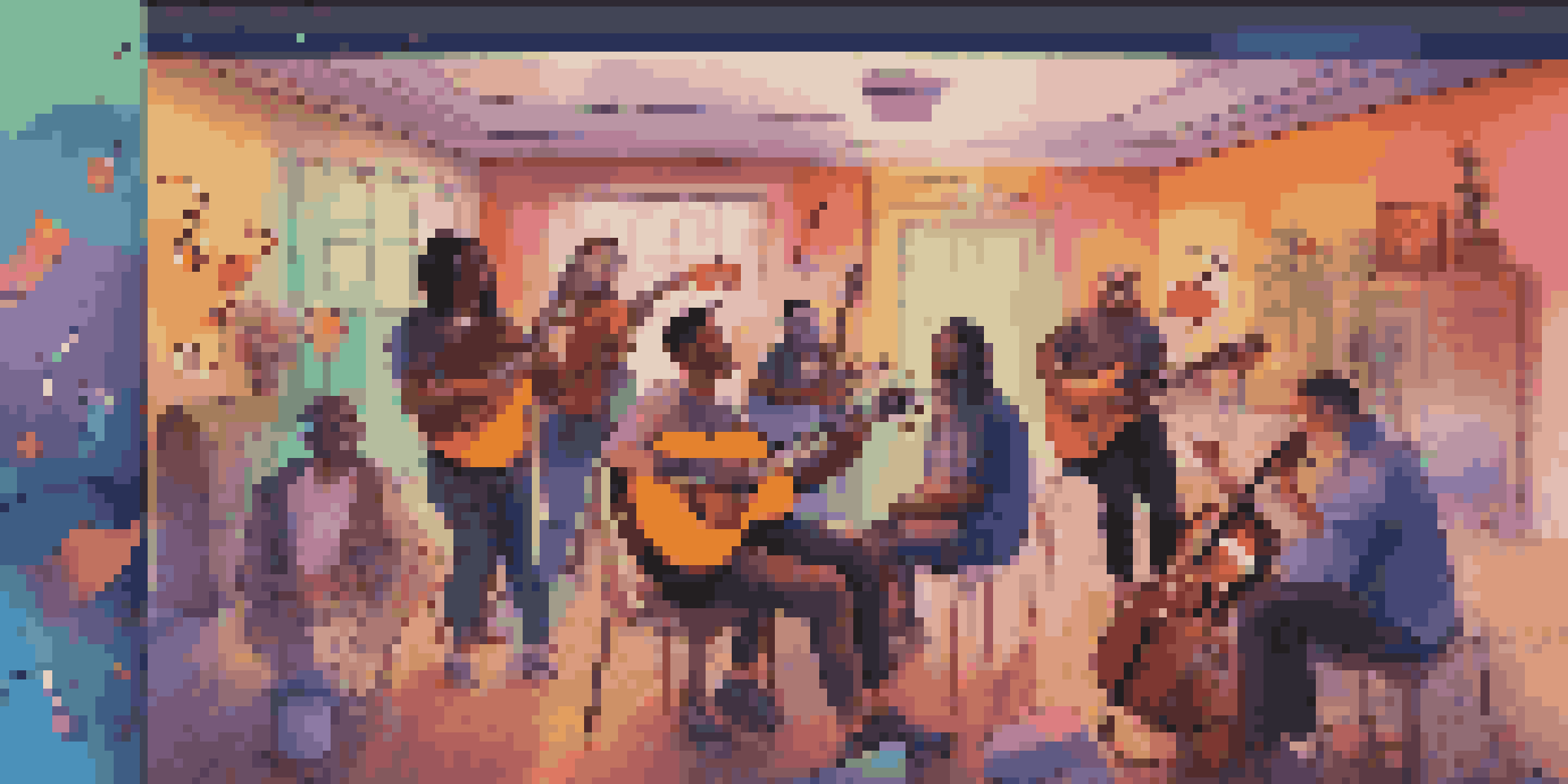Utilizing Online Communities for Music Education Support

The Rise of Online Communities in Music Education
In recent years, online communities have transformed the landscape of music education. With platforms like Facebook, Reddit, and specialized forums, musicians can connect and collaborate across the globe. These communities allow learners of all levels to share resources, ask questions, and offer feedback, creating a supportive learning environment.
Music is a world within itself, it’s a language we all understand.
Imagine a budding guitarist in a small town who suddenly has access to a world of knowledge and support just by joining an online group. This connectivity empowers students to learn at their own pace, find mentors, and even collaborate on projects. It’s like having a virtual music school right at their fingertips.
Moreover, these communities often host challenges, workshops, and live sessions, making learning interactive and engaging. This shift from traditional classroom settings to online platforms opens up new avenues for creativity and collaboration that were previously unimaginable.
Benefits of Peer Support in Music Learning
One of the standout features of online music communities is the peer support they foster. When students share their struggles or triumphs, they often receive encouragement and advice from fellow musicians who understand their journey. This camaraderie can significantly boost a learner’s confidence and motivation.

For instance, a student might post a video of their latest performance, receiving constructive feedback from experienced musicians. This immediate response not only helps them improve but also creates a sense of belonging. Everyone loves a cheerleader, and in these communities, every member can be one.
Empowerment Through Online Connections
Online communities allow musicians to connect globally, providing access to resources and support that enhance their learning experience.
Additionally, peer support can lead to collaborative learning opportunities. Students can form virtual bands, join group practice sessions, or even participate in online jam sessions, making music education a social and enjoyable experience.
Accessing Diverse Learning Resources Online
Online communities are treasure troves of diverse learning resources. From video tutorials and sheet music to articles and podcasts, members can find an array of materials that cater to their specific interests and learning styles. This abundance of resources makes it easier for students to explore different genres and techniques.
The beautiful thing about learning is that no one can take it away from you.
Consider a drummer who wants to learn jazz. By engaging in an online community, they can find specialized resources that might not be available in their local area. This access enables them to expand their musical horizons and develop a more versatile skill set.
Furthermore, many communities encourage members to share their own resources. This collaborative spirit helps keep the learning materials fresh and relevant, as musicians constantly update and add new content that reflects current trends and techniques.
Mentorship and Guidance from Experienced Musicians
Another significant advantage of online communities is the ability to connect with experienced musicians who often serve as mentors. Many seasoned players are eager to share their knowledge and offer guidance to aspiring musicians. This mentorship can be invaluable, providing insights that go beyond what one might learn from books or videos.
For example, a young composer might seek advice on arranging their first piece and find a mentor in a professional musician who’s been in the industry for years. This kind of personalized guidance can help avoid common pitfalls and accelerate the learning process.
Peer Support Boosts Learning
The camaraderie in online music groups fosters encouragement and collaboration, significantly boosting students' confidence and motivation.
Moreover, mentor relationships often extend beyond technical advice. They can provide emotional support, helping students navigate the challenges of pursuing music as a career or hobby, which can sometimes feel overwhelming.
Creating Accountability Through Community Engagement
Engaging in an online community can create a sense of accountability among musicians. When students share their goals, like learning a new song or mastering a technique, they often feel a commitment to follow through, knowing others are cheering them on. This accountability can be a powerful motivator.
Imagine posting a commitment to practice an hour a day. As community members check in and encourage each other, the likelihood of sticking to that goal increases significantly. It’s a simple yet effective way to turn intentions into actions.
Additionally, some communities host regular challenges or competitions that encourage members to showcase their progress. These events not only foster accountability but also celebrate achievements, big or small, reinforcing the positive aspects of learning together.
Finding Specialized Groups for Niche Interests
One of the unique aspects of online communities is the ability to find groups dedicated to niche interests within music. Whether it’s a specific genre, instrument, or technique, there’s likely a community out there for it. This targeted approach allows musicians to dive deeper into their passion areas.
For instance, a violinist interested in Baroque music can connect with others who share that specific interest, exchanging tips and resources that cater to their unique style. This level of specialization enhances learning and fosters a sense of belonging among like-minded individuals.
Access to Diverse Resources
Members of online music communities can tap into a wide array of specialized learning materials that cater to varied interests and skill levels.
Furthermore, these niche communities often lead to collaborations and projects that might not happen in more general settings. By connecting with others who are equally passionate, musicians can explore new creative avenues and push each other to reach new heights.
Overcoming Challenges and Building Resilience
Like any educational journey, learning music online comes with its challenges. However, being part of a community can help musicians navigate these hurdles together. Whether it’s dealing with performance anxiety or struggling with a difficult piece, members can share their experiences and coping strategies.
For example, a student might express frustration over a challenging solo. In response, fellow community members can share their own stories of struggle, along with tips on how they overcame similar obstacles. This shared resilience fosters a culture of support and perseverance.

Ultimately, these challenges become opportunities for growth. By facing difficulties together, musicians learn not only technical skills but also valuable life lessons about resilience, collaboration, and the importance of community.
The Future of Music Education Through Online Communities
As technology continues to evolve, the role of online communities in music education is likely to expand even further. With advancements in virtual reality, artificial intelligence, and interactive learning platforms, the possibilities for collaborative learning are endless. Online communities will be at the forefront of these innovations.
Imagine a future where musicians can participate in virtual jam sessions with others from around the world, experiencing real-time collaboration regardless of location. This kind of technology could revolutionize how music is taught and learned, making it more accessible and engaging than ever before.
In conclusion, online communities are reshaping music education by providing support, resources, and connections that empower musicians to thrive. As we move forward, embracing these digital spaces will be essential for anyone looking to grow in their musical journey.